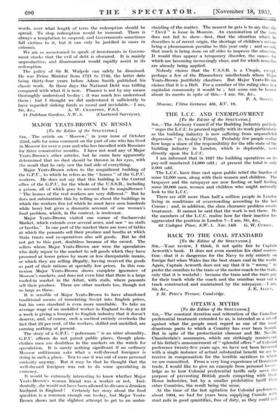in Moscow for over a year and.who has travelled with
Russians for three consecutive months. I have not read any of Major Yeats-Brown's other articles, but he came here apparently determined that no dust should be thrown in his eyes, with
the result that he only saw the bad side of everything. • Major Yeats-Brown refers to the magnificent building of the G.P.U., to which he refers as the " homes " of the G.P.U. workers. He does not say that this building is the Central office of the G.P.U. for the whole of the U.S.S.R., including prison, all of which goes to account for its magnificence !
"The homes of the real workers are very different." But he floes not substantiate this by telling us about the buildings in which the workers live (of which he must have seen hundreds while here) but gives a dramatic account of one woman's food problem, which, in the context, is irrelevant.
• Major Yeats-Brown visited one corner of Sucharevski Market, which extends over several acres, and saw" no stalls or booths." In one part of the market there are rows of tables at which the peasants sell their produce and booths at which State trusts and co-operatives also sell goods. But he did not get to this part, doubtless because of the crowd. The sellers whom Major Yeats-Brown saw were the speculators who daily repair to the market to sell goods which they have procured at lower prices by more or less disreputable means, or which they are selling illegally, having received the goods as part of their rations at specially low prices. In this con- nexion Major Yeats-Brown shows complete ignorance of Moscow's markets, and does not even hint that there-is a large roofed-in market in the Arbat, with stalls, where peasants sell their produce. There are other markets too, though not so large as these.
It is sensible of Major Yeats-Brown to have abandoned traditional means of translating Soviet into English prices, but his own standard is even more unreliable. To take an average wage of an unskilled worker in England to-day as £3 a week is giving a bouquet to English industry that it doesn't deserve, and, of course, such a method entirely overlooks the fact that 23 per cent. of the workers, skilled and unskilled, are earning nothing at present.
The story of a G.P.U. " policeman " is an utter absurdity.
G.P.U. officers do not patrol public places, though plain- clothes men are doubtless in the markets on the watch for speculation. It is surely nothing significant if an ordinary Moscow militiaman asks *hat a welt-dressed foreigner is doing in such a place. Ten to one it was out of mere personal curiosity anyway. But it may be that he thought that the well-dressed foreigner was out to do some speculating in currency.
It would be extremely interesting to know whether Major Yeats-Browft's woman friend was a 'worker or not. Inci- dentally, she would not have been allowedlo divorce a drunken husband in England , Certainly her story about the food question is a common enough one to-day, but Major Yeats- Brown shows not the slightest attempt to get to an 'under-
standing of the matter. The nearest he gets is to say that the " Devil " is -loose in Moscow. An examination of the facts does not fail to show—first, that the situation which he describes is of recent. origin, the shortage of children's rations being a phenomenon peculiar to this year only ; and second, that much is being done on all sides to improve the situation. It would thus appear a temporary :disorder, the cau.ses for which are becoming increasingly clear, and for which reniedies are already being applied.
Nobody claims that the U.S.S.R. is a Utopia, except, perhaps a few of the Bloomsbury intellectuals whom Major Yeats-Brown justifiably chastises. But Major Yeats-Brown claims that it is a Hell. For a member of the ruling class in a capitalist community it would be ; but some can be honest about its merits in spite of this.—! am, Sir, &c.,
































































 Previous page
Previous page